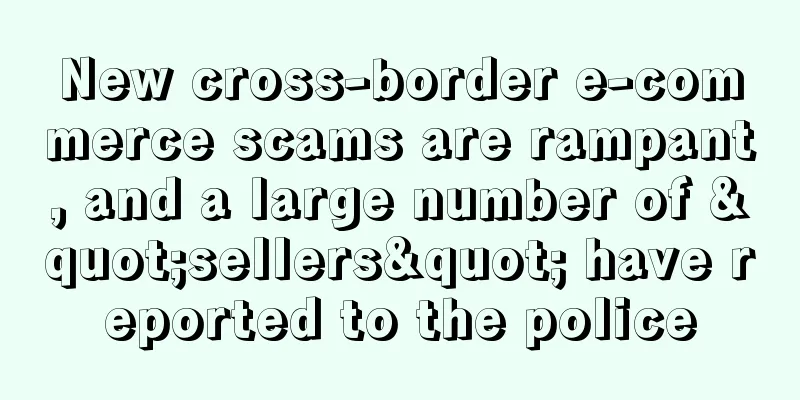New cross-border e-commerce scams are rampant, and a large number of "sellers" have reported to the police

|
When you open social media now, you will often see information like this: "Cross-border e-commerce with no source of goods, easy monthly income of 50,000, guaranteed profit without loss." In fact, this is a new scam. Criminals disguise themselves as cross-border e-commerce and defraud large amounts of money.
According to preliminary estimates by the General Administration of Customs, China's cross-border e-commerce exports will reach 1.83 trillion yuan in 2023, an increase of 19.6%. Wei Jianguo, former vice minister of the Ministry of Commerce, said that China's cross-border e-commerce will become the fastest growing sector in the world in the next five years, and will form a tripartite pattern with general trade and processing trade in China's exports.
The broad development prospects have attracted a large number of people to come and make money, but at the same time, some people with bad intentions have also started to have evil intentions. They use false advertisements to attract a large number of people who are interested in cross-border e-commerce or want to make quick money, and sell goods on the fake cross-border e-commerce websites they have built. Then they use technical means to manipulate the orders, so that the victims continue to purchase goods from the platform to fulfill the orders in the store. The money from these orders cannot be withdrawn at all, but all the money from the purchases goes into the pockets of the scammers.
In the past one or two years, this type of scam has been particularly rampant. It is difficult for novice sellers entering the cross-border e-commerce industry to identify them, and a large number of people have been deceived , casting a shadow on the rising cross-border e-commerce.
A large number of "sellers" suffered huge losses
"High returns", "no threshold", "make money while lying down", "no need to stock up"... These keywords almost all tap into the weaknesses of human nature, making it hard for people not to be tempted. However, as the old saying goes, "There is no free lunch in the world", so there is a huge pit hidden behind this. In the past one or two years, many people have said that they have fallen into a pit and been cheated of a lot of money.
At the end of last year, Ms. Cheng from Chongqing reported to the police that she had been cheated. It turned out that after seeing a cross-border e-commerce advertisement on a short video website that said "drop shipping, step-by-step instructions on store opening and operation, guaranteed profit", she added the contact information of the so-called "cross-border e-commerce customer service" and successfully opened a store with the help of the other party. From here, Ms. Cheng stepped into the deep pit dug by the other party step by step.
Soon after the store opened, someone placed an order, so Ms. Cheng paid in advance to purchase goods, and then "drop-shipped" through overseas websites. At first, she did successfully withdraw a lot of profits. However, as the number of orders increased, she paid more and more money in advance, but suddenly she could not withdraw the profits. She contacted customer service, but the other party continued to induce her to transfer money to unfreeze the account on the grounds that her account was frozen due to operational errors. After realizing that she was cheated, she called the police for help. According to statistics, the amount of money she was cheated was as high as more than 210,000 yuan.
Mr. Yang from Wuxi had a similar experience to Ms. Cheng. At first, Mr. Yang met a female netizen online. After chatting with her, they gradually became familiar with each other. Then the other party began to recommend him to do cross-border e-commerce, saying that he only needed to spend money to register an online store, the source of goods would be provided by the website, and he could "earn money from foreigners while lying down" by just moving his fingers to place an order.
Unable to resist the temptation, he quickly registered an online store and recharged it. Under the other party's inducement, he transferred more than 15,000 yuan in succession. However, when he was about to operate the store, he found that he could no longer log in to the store. He contacted customer service and got the reply that "a deposit of 2,000 US dollars is required to unblock it." Only then did Mr. Yang realize that he had been cheated and called the police.
Such incidents are common, with victims being defrauded of amounts ranging from tens of thousands to millions. Police in many places have warned that this is a new scam, and even the National Anti-Fraud Center recently issued a prevention warning . Many people have left comments in the comment section saying they have been tricked by this type of scam.
The victims are from all over the country, with different identities and ages. One netizen said helplessly that his mother also fell into this kind of scam. She, who is usually frugal, has invested thousands of yuan. "I was deceived into buying health products and got something to take away, but this product doesn't even have the real thing, but people dared to invest money just by posting pictures and prices." In one of the nearly 500 people in the collection group of a fake cross-border e-commerce platform, the victims are from Suzhou, Chongqing, Hangzhou, Shanxi, Guangxi, Wuhan, Kunming, Yantai, Yili and other places.
Among them, some realized it was a scam when they were unable to withdraw cash and called the police, but some did not realize it until their money was drained out. "During the time when the store was running, my family advised me several times that it was a scam, but I kept investing. I only discovered the problem when I had no money left and wanted to close the store and withdraw cash. The first time I wanted to withdraw cash, they told me it would take more than ten days to process the operation, and when the time was up, they found various excuses to continue dragging it out, " said a victim.
“Fake platforms” emerge in endlessly
In this new scam, victims usually sell through a cross-border e-commerce platform, but this platform is a "fake cross-border e-commerce platform" set up by fraudsters. These fake platforms can be roughly divided into the following two categories:
The first is fake platforms. These are mainly some mainstream platforms. Amazon, eBay, Lazada, Shopee , wayfair, Lelong, etc. have been used by fraudsters, and even offline retail giants such as Costco and Target have not escaped . The fake websites launched by scammers usually have similar names to these platforms, and even the web page design is similar. The company address displayed on the web page is also the same, such as ebaysmalls.top, eBaytop.cyou, eBaysmall.world , and Lelong shop . However, if you look closely, you will find that their URLs are different from the official .com domain name .
Xiaohong from Taizhou was deceived in this way. Xiaohong had always wanted to do e-commerce, so she left her information online, hoping to get help from a noble person. The so-called "good-hearted person" did appear and suggested that she do eBay and provided her with a purchase website. After Xiaohong successfully opened a store, the familiar routine appeared again: receiving orders - advance payment - order volume increased - unable to pay for purchases - store was downgraded or even frozen. In the end, although the payment of 360,000 yuan was stopped with the help of the police, the balance of 40,000 yuan in the store account could no longer be withdrawn.
A netizen also encountered a similar scam. The other party claimed that the platform was very easy to operate under the name of Wayfair and that he could teach the netizen how to do it, but he would take 10% of the profit. Later, after being reminded by someone, he discovered that the platform he had created was a fake cross-border e-commerce platform disguised as Wayfair.
The second is the cross-border e-commerce platform created by fraudsters. In the first case, there is an official platform. In this case, the platform is equivalent to being made up by the fraudsters . For example, SUEZ, Starday, Metashop, etc. are all fictitious by fraudsters.
Before Starday went bankrupt, few people thought it was a fake platform because it packaged itself too well. Promotional information about it could be seen everywhere on the Internet, with investment promotion meetings held here and inspections there. But in the end, such a platform was exposed for online fraud and illegal fundraising, and a large number of sellers were deceived, with the cumulative amount reaching tens of millions.
SUEZ is also very good at packaging itself . In its promotional materials, it not only has a foreign giant as a major shareholder, but also has a listing on the Shanghai Equity Exchange and is a government-led investment attraction enterprise. Many people believe in this and are tempted by the high profits it promises, so they rush in to open stores.
Until one day, all the merchant data on the SUEZ application was cleared, the original merchant backends disappeared, and the legal representative's office was deserted, and the sellers realized that they had been cheated. In the end, more than 40,000 people fell into this pit, and hundreds of millions of assets were defrauded and transferred.
After the explosion, these scammers, in order to buy time to escape and make a final "harvest", widely spread the so-called "withdrawal channel" through the Internet . In order to increase credibility, they not only made announcement documents, but also photoshopped the information onto news footage in traditional media.
But in fact, this is not a perfect scam. If the victimized sellers carefully identify it, they will find that this platform is fake. First of all, if you check the company, you will find a problem. That is, the company was listed in the abnormal operation list by the Hangzhou High-tech Zone Market Supervision and Administration Bureau in the fifth month of its establishment . Secondly, it is not an easy thing for a company to be listed on the market. Many conditions need to be met, one of which is that the business time is more than three years, and the company where SUEZ is located was less than a year from its establishment to the bankruptcy.
What is frustrating is that even if these fake platforms are exposed or taken down by public security organs , new ones continue to emerge, and people are still deceived by the same tricks. How to avoid being deceived is a question that needs to be considered.
Uncover the scammers’ tricks
In fact, "no-source cross-border e-commerce" and "drop shipping" are business models that allow sellers to sell goods on cross-border e-commerce platforms without actual inventory. The core of this model is to cooperate with suppliers, upload the supplier's product information to their own stores, and after the customer places an order, the supplier will directly ship the goods to the customer.
This model actually exists in the cross-border e-commerce industry, and its advantages include:
Reduce costs: No need to bear inventory management and warehousing costs, reducing operating costs and risks.
Expand your product range: You can sell products from a variety of different suppliers, providing a wider range of choices.
Flexibility: Flexibly choose products to sell according to market demand and trends, avoiding the risk of inventory backlog.
But now this business model has been deliberately misinterpreted by some people with ulterior motives, who describe it as a business that is sure to make a profit and easily earn over ten thousand yuan a month.
From the perspective of the scam itself , their routine is not complicated, and the National Anti-Fraud Center also exposed this not long ago :
Fraud gangs usually claim to provide supply, free teaching, free platform, and that you can open a cross-border online store with a small cost, allowing you to earn over ten thousand yuan a month without leaving home. After you recharge and purchase on the platform, as expected, you will quickly make your first pot of gold from the first order, and then the orders will increase. This creates the illusion that the store is booming, in order to lure sellers to continue purchasing, investing, and recharging. When the invested capital increases and the store's profits get higher and higher, the account will be frozen due to operational errors, delivery delays, product infringement, etc., and a deposit will be required to unfreeze the account.
Therefore, novice sellers only need to remember one thing when engaging in cross-border e-commerce: those platforms that ask you to advance funds for purchases after placing an order are all scam platforms.
So how do these scammers find “victims”?
They usually "ambush" on major social media platforms, such as disguising themselves as sellers, posting some order screenshots, claiming that they have made a lot of money through cross-border e-commerce, or leaving comments like "I am working on XX platform, it's quite profitable, welcome to communicate" under some cross-border e-commerce related short videos and articles. In addition, they attract traffic through live broadcasts. The so-called teachers in the live broadcasts will share some cross-border e-commerce related knowledge for free, during which they will also talk about how successful they are in the field of cross-border e-commerce.
In addition, they will promote the so-called agency operation services through popular social media platforms such as WeChat and WeChat, and publish advertisements with keywords such as "cross-border e-commerce", "no store deposit", and "no need to stock up". Some fake cross-border e-commerce platforms will also attract people's attention through offline promotional activities and exhibitions.
The purpose of these operations is to attract the attention of the target group and then establish contact with them. After successfully establishing contact, the next step is to guide them to register an e-commerce store.
In order to avoid becoming a victim of fake cross-border e-commerce platforms , Ennet has two suggestions: First, stay vigilant, be wary of overly tempting discounts and high returns, and do not easily believe unverified information; second, verify the legitimacy of the platform . When choosing a cross-border e-commerce platform, carefully verify its legitimacy and credibility, and check user reviews, media reports, etc. If you suspect that a cross-border e-commerce platform is fake or encounter suspicious situations, you should report it to the relevant departments in a timely manner and communicate with legal institutions or platforms.
Cross-border e-commerce is great, but it is fake that you can make money without losing money
According to data from the General Administration of Customs, in 2023, China's cross-border e-commerce imports and exports reached 2.38 trillion yuan, a year-on-year increase of 15.6%. Among them, exports reached 1.83 trillion yuan, a year-on-year increase of 19.6%. In recent years, China's cross-border e-commerce has maintained a rapid development momentum, growing nearly 10 times in 5 years.
The prosperity of the cross-border e-commerce industry is attracting more entrepreneurs to join in. Tianyancha shows that in the first half of 2023 alone , there were more than 8,380 newly registered related companies, an increase of 30% compared with the same period in 2022 .
However, it has been exploited by people with bad intentions, and this industry has been packaged as a "money-making" industry. However, sellers who have been deeply involved in the industry for many years know that this industry is not that easy. The industry bonus has passed, and the current situation is fierce competition and serious internal circulation. Sellers need to bear tremendous pressure. One seller lamented that he entered the industry in 2015, from having nothing to leading a team of more than 100 people, with annual sales of more than 100 million, but owed millions of debts, and he didn't know if he would ever get ashore.
A seller who had worked on Amazon for seven years said this when he “quit”: “ After so many years, I have seen a lot of things clearly . If you don’t have a factory, technology, brand, or private models and rely solely on domestic platforms to select products and then sell them on Amazon, I sincerely suggest that you get out now while you can while you still don’t lose much . ”
Experienced sellers are struggling to survive, let alone newcomers who have no resources and experience? It is conceivable that those who claim that they can make money on a certain platform are definitely not reliable.
A successful cross-border e-commerce business requires comprehensive consideration of multiple factors, including market demand, product selection, supply chain management, marketing strategy, competitive environment, etc. Even if you have experience in a field or understand some market trends, you cannot fully predict and avoid all risks.
People often say that free things are the most expensive. This is also true for new cross-border e-commerce scams . If you want to avoid being cheated, you must remember that "there is no such thing as a free lunch". The truly profitable businesses are all hidden. Even if this business is so easy to do, why don't they do it themselves, and why would they train you for free? As the police officer at the National Anti-Fraud Center said: "You don't have to select products, put them on the shelves, or purchase goods. There is also such a complete supply chain. Is this really your turn? Who is making money from whom?"
Fortunately, many social media platforms have now realized the serious consequences of the spread of such scams on their platforms and have taken steps to address them. For example, Douyin has banned the placement of "cross-border e-commerce" related advertisements, and not long ago, Tencent's "WeChat 110" public account also published an article exposing this scam.
The public security organs are also stepping up their crackdown efforts. For example, at the end of last year, after receiving a report from the victim Yu, the Daqing Public Security Bureau immediately launched work and arrested three suspects after several days of surveillance. New scam in cross-border e-commerce |
>>: Annual salary exceeded 1 million in 3 years! Anker took action to "steal people"
Recommend
Shopee 9.9 Super Shopping Festival concluded with over 45 million items sold in 99 minutes
Leading e-commerce platform Shopee announced the ...
Wal-Mart proposes new rules for price cuts
It is reported that Walmart recently plans to int...
During the holiday shopping season, e-commerce faces challenges such as supply chain and returns
According to an ACG Global survey, 41% of retaile...
What is Schwab.de? Schwab.de Review, Features
Schwab.de is an e-commerce platform under the Otto...
Sellers’ new trick to solicit reviews: Donate a football for each review
Sellers have been working hard to get users to le...
After three years away from overseas exhibitions, these domestic brands "fight against the epidemic and move forward" and collectively appear at the top international beauty exhibitions
Recently, Alibaba International Station teamed up...
What is OrderCup? OrderCup Review, Features
<span data-docs-delta="[[20,{"gallery"...
UK exports to EU begin to partially rebound after slump in January
Official data showed that UK exports to the EU ro...
What is zeesea? zeesea Review, Features
Zeesea was founded in China in 2011 and is rapidly...
Sales volume is back! Some Amazon sellers are seeing a rebound in sales
After the New Year, sales of many Amazon sellers ...
SHEIN Foundation established to help solve global textile waste problems and empower communities
SHEIN, the world's leading online fashion and...
What is StarPost? StarPost Review, Features
Star Mail Supply Chain (Shenzhen Star Mail Supply ...
What is Avalara? Avalara Review, Features
Founded in 1995 by a team of tax experts and techn...
What is Pipe? Pipe Review, Features
Pipe was founded by a team of passionate entrepre...
Southeast Asia's cross-border e-commerce industry is undergoing a dramatic change. Alibaba International Station provides comprehensive support for Chinese sellers
Recently, Indonesia suddenly introduced new e-com...









